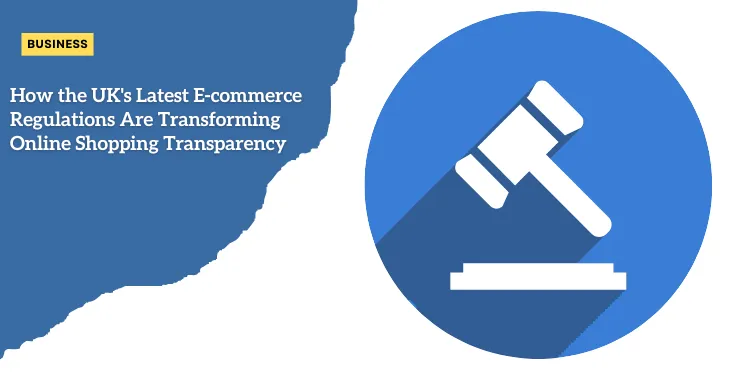How the UK’s Latest E-commerce Regulations Are Transforming Online Shopping Transparency

Anúncios
Overview of the Consumer Rights Act Changes Implemented on Sunday
Recent changes underscored by the new Consumer Rights Act brought into effect last Sunday are set to reshape the UK e-commerce landscape.
This groundbreaking legislation aims to tighten the reins on online shopping practices, fostering an environment of transparency and safeguarding consumer interests.
Anúncios
Enforced by the Competition and Markets Authority (CMA), the act mandates that online platforms disclose all obligatory fees upfront, eliminating deceptive pricing tactics that surprise consumers at checkout.
Key Objectives: Enhancing Transparency and Consumer Protection
The primary objective of this legislative overhaul is crystal clear: to enhance consumer protection by promoting transparency and honesty in online transactions.
By compelling e-commerce platforms to transparently display all mandatory costs from the outset, the new regulations aim to eliminate the frustrations of hidden fees and unexpected charges.
Anúncios
Additionally, the act tackles the pervasive issue of fake reviews which can mislead consumers and distort the competitive field.
Scope and Impact on Online Shopping Platforms
The scope of these regulations is expansive, impacting a broad spectrum of online services including:
| Service Type | Regulatory Change | Impact on Consumers and Businesses |
|---|---|---|
| 🍕 Food Delivery Services | Delivery charges must be integrated into advertised prices or displayed early in the checkout process | Consumers can see the total cost upfront, improving transparency and trust. Businesses may need to adjust pricing strategies. |
| 🎟️ Ticket Booking Platforms | Admin and booking fees must be clearly displayed from the start | Consumers get a true reflection of the total cost right from the beginning, enhancing the booking experience. Businesses may face challenges in adjusting existing processes. |
However, the rules do permit some exemptions for optional add-ons, such as fees for luxury airline seats or additional luggage, which are not required to be included in the initial price.
The legislation has also heightened scrutiny on the authenticity of online reviews.
Websites must now actively moderate reviews to ensure their genuineness, deterring businesses from using or commissioning fake testimonials to boost their ratings artificially.
Non-compliance carries heftier repercussions, with penalties that could reach up to 10% of a company’s annual global turnover.
Giants like Google have already begun adapting their systems in the UK to mitigate fake review practices and promote fair competition.
These changes are more than just regulatory updates—they represent a significant shift towards a fairer and more trustworthy online shopping experience.
They empower consumers, deter unscrupulous business practices, and signal a commitment to upholding high standards in the digital marketplace.
Tackling ‘Dripped Pricing’ Head-On
Definition and Problems Associated with Dripped Pricing Practices
Dripped pricing, a frustrating and misleading practice where additional fees gradually appear throughout the checkout process, has long plagued online shoppers.
Imagine you’re booking concert tickets: you select your seats, proceed to checkout, and suddenly, extra charges like booking fees and service charges appear, significantly inflating the total cost.
This practice catches consumers off guard, eroding trust in online platforms and adding an unwanted financial surprise to their purchases.
Mandatory Inclusion of All Required Fees in Advertised Prices
To combat this issue, the new UK e-commerce regulations mandate that online platforms must include all mandatory fees within the advertised prices of products.
This means that from the moment a consumer engages with a product listing, they should see the total cost without any hidden charges creeping in during checkout.
For sectors like food delivery and ticket booking services, obligatory fees such as delivery charges and administration fees must either be included in the overall price or clearly displayed upfront.
Exceptions for Optional Charges
While these regulations aim to eradicate unexpected mandatory fees, they do allow for certain optional charges to be treated differently.
Optional fees, such as those for airline seat selection or baggage upgrades, can still be presented as additional costs during the checkout process.
The key distinction here is that these charges are genuinely optional and dependent on consumer choice, rather than obligatory hidden fees.
This transparent approach not only ensures fairer pricing but also fosters greater consumer confidence.
As buyers become more aware of the total costs involved, they can make better-informed decisions, leading to a more trustworthy and efficient online marketplace.
As we move further into the realm of consumer protection, the regulations also address the rampant issue of fake reviews, setting the stage for more credibility in online shopping experiences.

Combating Fake Reviews: New Rules and Responsibilities
Ban on Using or Commissioning Fake Reviews
The era of businesses gaming the system with fake reviews is coming to an end in the UK.
According to the new regulations under the Consumer Rights Act, it is now illegal for businesses to use or commission fake reviews to artificially inflate their ratings.
This initiative aims to restore trust in online marketplaces by ensuring that reviews are genuine, reflecting the actual experiences of real customers.
Website Providers’ Obligations for Review Moderation
The responsibility for combating fake reviews does not end with businesses.
Website providers also play a crucial role in maintaining the integrity of online reviews.
According to the new rules, websites that publish or provide access to consumer reviews must take “reasonable and proportionate steps” to identify and remove fake reviews.
This means that website providers need to implement robust review moderation systems to detect and eliminate fraudulent content, ensuring that the reviews they display are trustworthy and reliable.
Penalties for Non-Compliance
To enforce these new regulations, the UK’s Competition and Markets Authority (CMA) has the authority to impose significant penalties on businesses and website providers that fail to comply.
Non-compliance can result in fines of up to 10% of a company’s annual global turnover.
This substantial financial deterrent highlights the seriousness with which the UK government is treating the issue of fake reviews and underscores its commitment to protecting consumers.
From the clampdown on misleading pricing to the rigorous control of review authenticity, these measures are reshaping the landscape of online commerce, paving the way for a more transparent and trustworthy digital marketplace.
Industry Response and Implementation
Google’s Proactive Measures
To meet the new UK regulations head-on, Google has rolled out significant updates geared towards eliminating fake reviews from its platforms.
The tech giant recognizes the influence and trust that genuine reviews have on consumer behavior and is committed to enhancing transparency for its users. As part of these updates, Google is employing advanced algorithms and manual checks to identify and remove fraudulent reviews.
This move is intended to maintain the integrity of online ratings and ensure that businesses are competing fairly based on legitimate customer feedback.
Impact on Food Delivery and Ticket Booking Platforms
The enforcement of these new regulations has profound effects on sectors like food delivery and ticket booking. Historically, these services have been plagued by hidden fees that catch consumers off guard at checkout.
With the new mandate, platforms must now incorporate all mandatory fees into the advertised prices, making it easier for consumers to understand the total cost upfront.
This leads to a more honest and straightforward shopping experience, which can enhance consumer trust and satisfaction.
Additionally, the crackdown on fake reviews ensures that ratings for these services reflect genuine customer experiences, further empowering consumers in their purchasing decisions.
Level Playing Field for Compliant Businesses
By clamping down on fake reviews and hidden fees, the UK’s new e-commerce regulations are creating a fairer marketplace.
Businesses that have always adhered to ethical practices now get the recognition they deserve.
Without the threat of being undercut by competitors using deceptive tactics, compliant businesses can focus on providing high-quality products and services.
This shift not only benefits consumers but also fosters a healthier competitive environment where businesses thrive on merit rather than manipulation.
These changes represent a significant step towards a more transparent and trustworthy online shopping experience, echoing across various industries and helping forge a fair competitive landscape.
Benefits and Future Implications
Enhanced Consumer Confidence and Protection in Online Shopping
The recent UK e-commerce regulations are a game-changer for consumer protection.
By banning ‘dripped pricing’ and fake online reviews, these measures ensure a more transparent and trustworthy shopping experience.
When consumers see the full cost upfront, it eliminates unpleasant surprises at checkout, boosting their confidence in online platforms. Additionally, knowing that reviews are genuine increases trust in product quality and platform integrity.
Contribution to Economic Stability Through Fair Competition
The new regulations also foster fair competition, leveling the playing field for businesses that adhere to ethical practices.
Companies that previously exploited loopholes to undercut their honest competitors will now have to play by the same rules.
This shift not only promotes fairness but also contributes to economic stability.
By eliminating unfair advantages, the marketplace becomes more competitive based on merit—essentially, businesses succeed by delivering real value to customers. This benefits the economy as a whole, encouraging innovation and quality service.
Potential Global Influence on E-commerce Regulations
The UK’s groundbreaking regulations could set a new standard for e-commerce globally.
As major players like Google adopt measures to combat fake reviews and ensure pricing transparency, other countries may follow suit.
This potential ripple effect could lead to more unified and stringent global e-commerce standards, ultimately benefiting consumers worldwide.
By fostering trust and fairness, these changes create a more stable and transparent market. Building on this foundation will likely pave the way for future innovations and improvements in the realm of online shopping.






